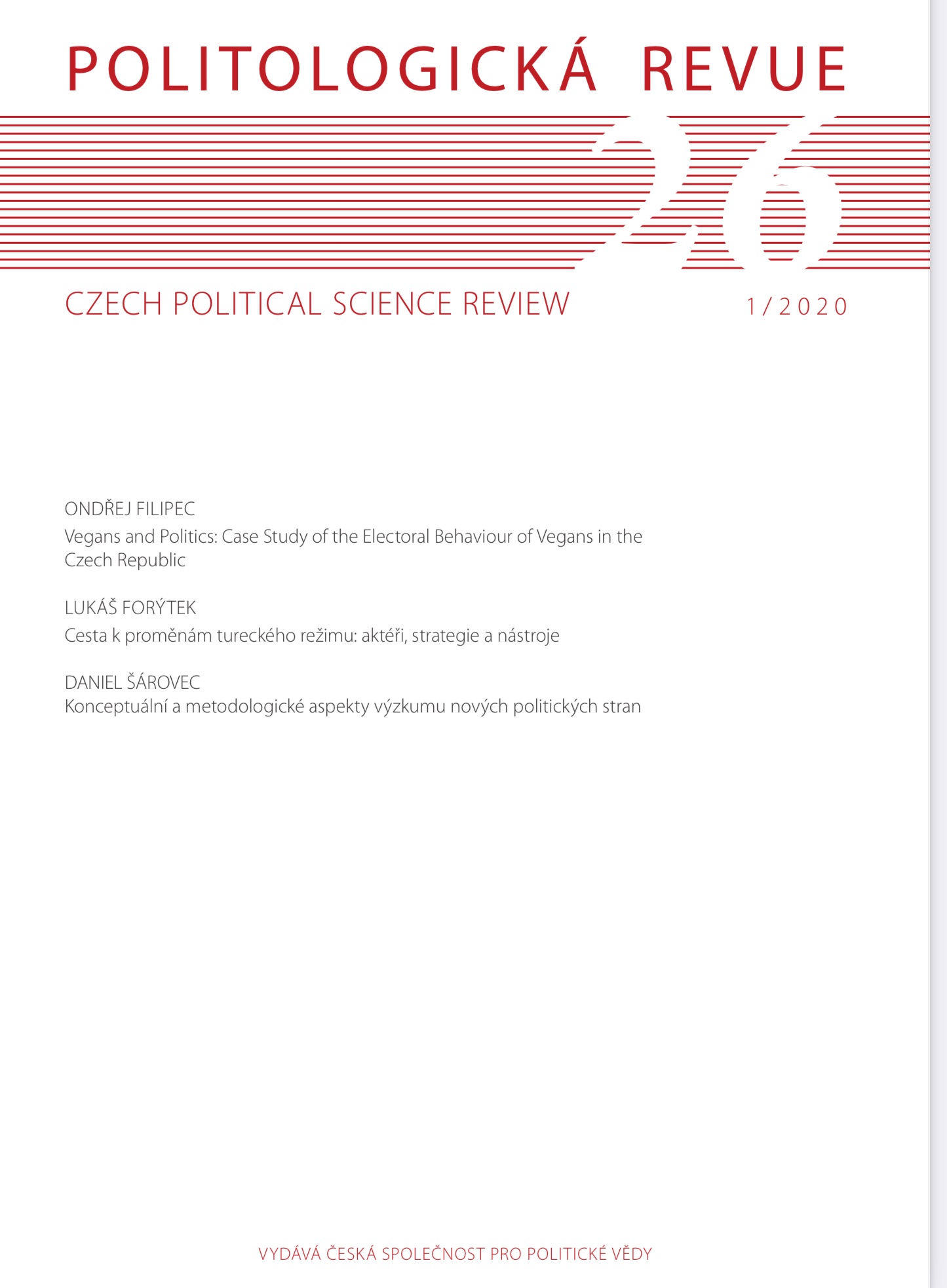Vegans and Politics
Vegans and Politics
Case Study of the Electoral Behaviour of Vegans in the Czech Republic
Author(s): Ondřej FilipecSubject(s): Politics / Political Sciences, Social Sciences
Published by: Česká společnost pro politické vědy
Keywords: Vegans; Veganism; Czech Republic; Segment; Vegetarians
Summary/Abstract: In the recent years there is increasing number of people interested in veganism. This is also a visible trend in the Czech Republic (and other EU countries) where veganism is lifestyle associated mainly with “generation Z”. Especially young people who were born after the fall of Communism and enjoyed free access to information tend to be more perceptive to the failures capitalism and globalisation including pollution, environmental degradation, production unsustainability, animal exploitation and suffering used and treated as an agricultural commodity. This critical approach is reflected in the lifestyle of increasing number of young Czechs with many implications including family relations, ecological and animal-focusing behaviour or political preferences. Despite the fact the segment seems to be increasing it is still relatively unknown from socio-demographic and socio-economic perspectives. Thus, the article aims to present Czech vegans from a socio-demographic and a socio-economic perspective and to provide key information regarding the segment’s specificity. The article presents data from a large online survey (conducted between the 8th and 31st of October 2018 among 1,167 Czech vegans and 1,128 Czech vegetarians and questionnaire containing 50 questions) which provided data for three important areas. Firstly, who are Czech vegans from a socio-demographic perspective? Secondly, what are the key factors and motivations for becoming vegan? and Thirdly, what are the political and value preferences of vegans? In other words: are vegans’ rather radical activist or conscious citizens? Despite the research target group being vegans, the author decided to also collect a sample of vegetarians due to fact that many vegans consider themselves rather vegetarians as they have very strict personal definition of veganism and therefore veganism is seen as an “ideal status”. Vegetarians in this research serve as “control sample” which helps to highlight the differences between vegans, vegetarians and Czech omnivores.The analysis confirmed that a vegan lifestyle is mainly associated with large cities and centres such as Prague or Brno, and that there is a high proportion of people with a university degree among vegans, especially those having a degree in humanities, social sciences or law. Socio-economic status of vegans showed that veganism is not only a student lifestyle, it tends to also spread into different professions. Because most vegans are women, veganism is also more common among professions represented by women. The relatively high average age of 27.65 years shows that veganism is not the lifestyle of youth, even though the number of young people attracted by this progressive and sustainable lifestyle is growing rapidly. If we consider that contemporary vegans have been vegans for 4.3 years, it means that vegans turn to veganism at around 23 years of age: basically, this means 25.5 years old in the case of men and 22.63 years in the case of women. Every year the number of vegans and vegetarians increase and over the last five years the tempo doubled. From the responses it is evident that the Internet plays an important role in providing and spreading information and plays an important part in the initial transformation. However, for a quarter of vegans, friends have provided them with their information. The most important (in 92% of cases) are personal conventions based on values such as compassion and solidarity and in 43% also the belief, that veganism is a natural and healthy lifestyle. Among the factors that are the most important on the way to veganism is the support of their partner and much less support of the family and media. Compared to the general public, vegans are much more active citizens regarding electoral participation. This was demonstrated during both the 2017 general and the 2018 presidential elections in the Czech Republic. If we consider populism, tense nationalism or communism as decadent and detrimental ideologies, then vegans demonstrated responsible voting. During elections to the chamber of deputies, vegans supported the Czech Pirate Party and the Greens which was not surprising due to electorate’s character. On the other hand, the study revealed that the traditional parties failed to work with this prospective segment. The vegan vote during presidential elections was clearly for the liberal democratic and pro-western oriented candidate Marek Hilšer. On the other hand, current president Miloš Zeman had very limited support and together with Andrej Babiš or Tomio Okamura are considered as least respected people. With regard to policies vegans are consistent in separating waste and therefore are well up on the general society’s average. Regarding agricultural policy, a vast majority of vegans are in favour of stricter regulation regarding the animal industry. However, around one fifth are in favour of a radical approach regarding a state ban for slaughter as most vegans are aware of the necessity of a gradual attitude, change of public perception and systemic changes. Vegans are also very active in civil society. Most of them try to reduce their own burden on the planet. Compared to vegetarian’s, vegans are more active in the NGOs or with a personal contribution to animal and environmental protection. Results show some limits regarding participation in the politics in general, on a local or state level. This might be caused by the fact, that vegans are largely young people. However, as showed in the second part, vegans have become important segment of the society and therefore it might be beneficial for some political parties to gain attention.
Journal: Politologická revue
- Issue Year: 26/2020
- Issue No: 1
- Page Range: 5-36
- Page Count: 32
- Language: English
- Content File-PDF

